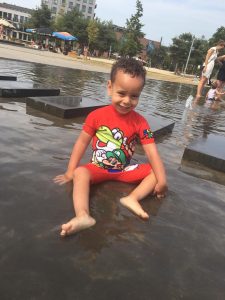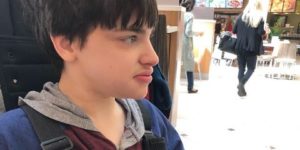Imogen
Share This Post
Imogen Ivy Martin – We like to call her Immi.
I have often thought about documenting Immi’s story, but I never actually started it, it seemed too much of a mammoth task. I think about the kaleidoscope of events that have taken place thus far and to be honest, it’s all a bit of a blur. The inclination was there, but the energy wasn’t. It still isn’t really, so this is far from perfect, but it will have to do for now. The actual documentation of events was initially requested by a researcher who was reaching out and asking for info on Immi to study GRI disorders. He wanted to know Immi’s present challenges, her interventions thus far and the medications we have tried. It was the first time I had real reason to recall this info, apart from verbally (and painfully) reciting it to every new health professional. So here we go…
Immi was born following a pregnancy that was generally normal. There was slight complication by a threatened premature labour at 32 weeks due to gastroenteritis at 20 weeks gestation and a nasty flu during the final trimester. Imogen made her grand entrance at 38 weeks through an assisted delivery, and although there was a mysterious knot in her cord, it was initially dismissed as harmless.
Soon after birth, Immi required a brief stint with oxygen support. It didn’t take long for us to realise that feeding was a challenge for her right from the early days. As if that wasn’t enough, her sleep cycle turned out to be an absolute nightmare. Just when we thought things couldn’t get more challenging, on day 4, she experienced her first “obvious” seizure. She went downhill very quickly resulting in intubation and an urgent flight to a larger hospital in the nearest city, where a series of investigations, including EEGs, MRIs, genetic screenings, and metabolic tests were carried out.
Before Immi turned 2, she had already weathered numerous complex medical emergencies, visiting six different hospitals, requiring intubation twice, and taking a staggering 14 ambulance rides. More tests were conducted, including lumbar punctures – yet everything seemed to appear ‘normal’ on the surface.
Imogen’s developmental milestones followed a unique timeline. She sat up for the first time at 10 months, crawled at 15 months, and took her first steps at the age of 2 ½. However, her gait remained unsteady and wide, and her balance and coordination struggled to keep up. Speech never found its way into her world, and she only proficiently uses two signs – ‘more’ and ‘toilet.’ Toilet training was an uphill battle that stretched out over the years, eventually resulting in success. However, she still requires full assistance with all aspects of personal hygiene. Puberty hit her at the age of 10, adding yet another layer of complexity to her daily challenges.
Imogen’s seizures have proven to be relentless, defying most treatment attempts. Her current medication cocktail includes Zonegran (Zonisimide), Ospolot (Sulthaime), Vimpat (Lacosomide), Frisium (Clobazam), Movox (Fluvoxamine), Tegratol (Carbamazepine), and Clonodine (Catapress). We are in the process of slowly introducing Perampanel and starting to wean the Ospolot.
She is also on Melatonin (to go to sleep), the contraceptive pill for menstruation management and we have Midazolam (intranazal) for emergency prolonged seizures.
She has been on many other anti-epileptic drugs over the years, all of which were deemed as failures.
Immi faces additional challenges in processing auditory and tactile information. Noise easily distracts her due to an under-responsive auditory system, yet she craves auditory input, creating a tug-of-war within her. Touch sensations through her skin and mouth pose difficulties, causing distress during activities like getting dressed, cutting fingernails, and brushing teeth or hair. She also exhibits a high tolerance for pain. Furthermore, her proprioceptive system, responsible for body awareness, is under-responsive.
The list of symptoms and challenges Immi faces is extensive, encompassing epilepsy, severe intellectual disability, long-sightedness (which required surgery for strabismus, but still necessitated glasses until the age of 13), poor muscle tone, compromised balance and coordination, sensory disorders, sleep disorders and apnoea, behavioural issues with obsessive-compulsive tendencies, absence of speech, limited sign language, and frequent irritability, most likely stemming from uncommunicated pain.
Throughout the years, our journey with Imogen has involved an army of medical professionals and specialists. Neurologists, ophthalmologists, speech therapists, occupational therapists, physiotherapists, hydro therapists, pulmonary specialists, paediatricians, chiropractors, kinesiologists, sleep study teams, swimming instructors, podiatrists, geneticists, Bowen therapists, early intervention teams, craniologists, and psychologists have all played a role in supporting her unique needs. Countless tests from EEGs, MRIs, and lumbar punctures to chest X-rays and hip ultrasounds, have been conducted in search of answers. We have left no stone unturned in our pursuit of understanding.
All of this and still no actual ‘reason’!! Yes, she has epilepsy…yes, she has an intellectual disability… yes, she has behavioural, sensory and sleep disorders and yes, in 2020 (age 14) she was diagnosed with Autism Level 3 – buy WHY and HOW?? What caused this??
The years went on and, the older she got, the hope faded that we would ever receive an official diagnosis for Immi. We spent each day ‘drowning’ and just trying to keep on top of things, scrambling through each day, trying to maintain paid employment whilst severely sleep deprived. Massive guilt was felt toward our other daughter who is 3 years older. We would work so hard to try to give her older sister a semi-normal life and would strive relentlessly to be involved in all her interests. Immi, through no fault of her own, simply exhausted the majority of our physical resources.
As time went on, it became apparent we not only had to negotiate the intricacy of parenting a complex child, but as her Mother, I was often thrown onto a battlefield. It felt like I always had the boxing gloves on, going head-to-head with people, often about red tape and bureaucracy. I was in combat with government departments, schools, respite providers, chemists, the list goes on. Advocating was a whole new world, but I must say, I have become fairly skillful at it of late. It never ends.
It also must be noted that we, as parents, spent many years grieving the child we thought we were going to have – but didn’t. This was not made any easier when people would say “God only gives these special children to those special parents who can handle them” or “I would never survive what you are doing – you are Amazing.” We are definitely not ‘Amazing’ and we have no choice but to try our best to survive. Any parent would do the same – there are no options. We were so consumed and living deep in the trenches that we found it hard to see any joy in what we were doing. Even writing this makes me feel sad, as we have changed and grown so much since these days, and see things very differently now.
Finally, in November 2021, after multiple attempts throughout the years sending DNA overseas, Imogen was diagnosed with GRIA2. She has a de-novo likely pathogenic variant, technically denoted as c.2420C>T.
Receiving this diagnosis was ENORMOUS. It was surreal that we had an actual condition to learn about, focus on, and the big one – I no longer had to blame myself for something I MUST have done during my pregnancy.
Immi having a GRI disorder has opened up a whole new world. All her life, she has never really fit into any one group. She has varied ailments, but collectively, she never totally belonged to any of them. Knowing there are other people in the world just like her makes us feel not so alone. The support from the foundation, CureGRIN, through GRI Connect and the GRI facebook group is such a comfort. Being asked to be their Australian Ambassador is a huge honour.
We have now decided parenting a child with profound disabilities introduces a unique perspective on life. It helps to re-evaluate what truly matters and appreciate the small victories. The journey becomes less about milestones and more about celebrating every triumph, no matter how small. The ability to find joy in seemingly ordinary moments becomes a cherished gift. The unwavering affection and connection experienced through children like Immi can be incredibly powerful and transformative.
Immi turns 18 very soon and will be finished with school. We are currently working extremely hard to build a safe and loving community for our girl. We are focusing on what her day to day will look like and how we can set her up for a time when we are no longer around. We are sadly faced with extreme challenges around resources and finding a care provider we can trust and build a relationship with that will stand the test of time and last far into the future. Her long-term security, safety, and happiness is at the forefront of everything at the moment.
In conclusion, Imogen is an incredibly charismatic human being. She lights up a room and wraps everyone around her little finger. She is highly sociable, funny, mischievous and has perfected the best bone crushing hugs. She absolutely loves music, animals and above all, ALWAYS being the centre of attention!
Yes, she should be the centre of attention. She deserves it.
Read more Posts

Haytham
I was, just as most moms when they discover they are expecting a child, so excited.

Logan
Logan has always had such a sweet disposition. I used to wish that if Logan could have anything in life it would be to be happy and to not be in pain, that wish has come true for the most part.
